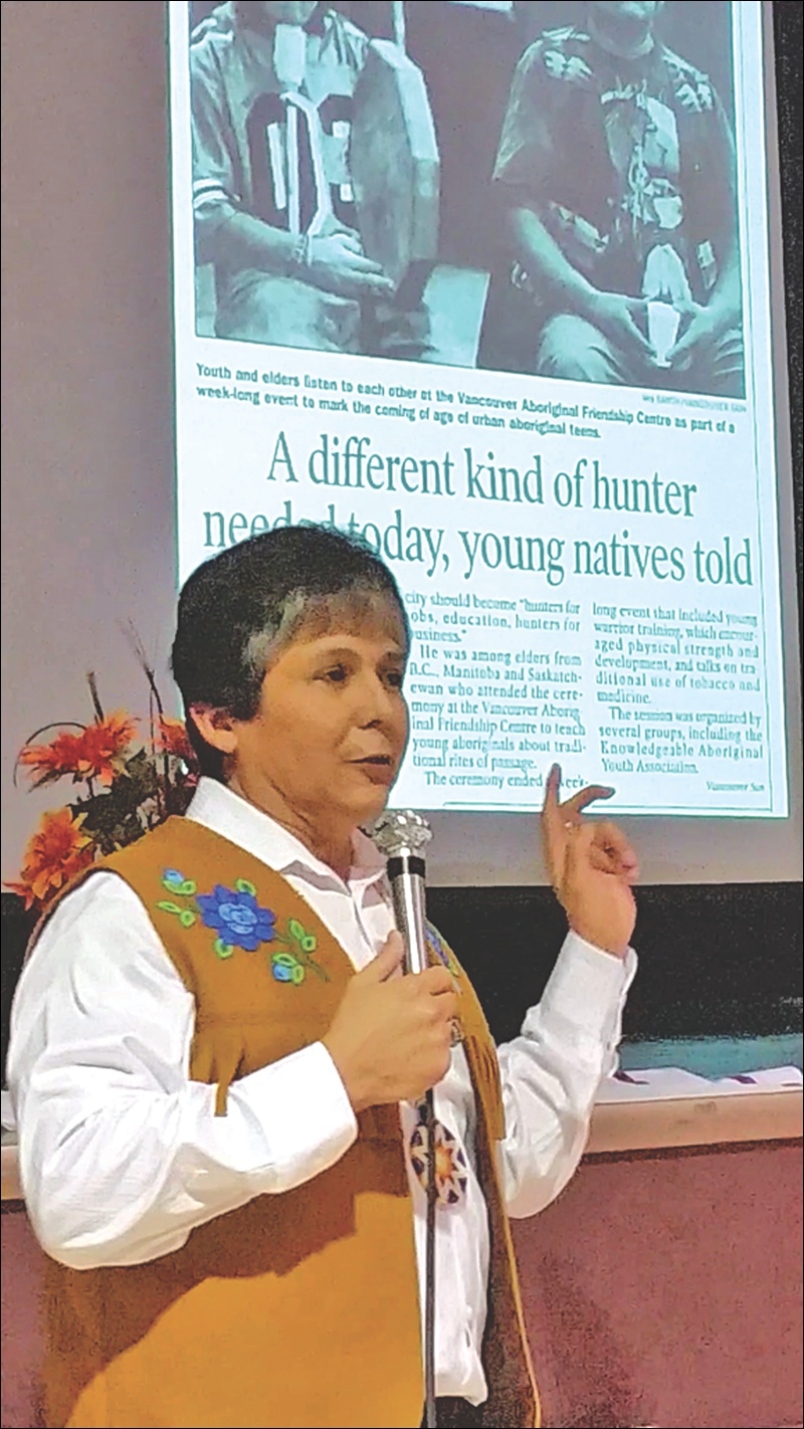‘Get a damn job’: Chief offers blunt remedy for what ails First Nations
The perfect message to all you punks out there on the blockade, and Unist’ot’en Camp.
Credits to Jonathon Naylor/ Flin Flon Reminder
February 13, 2016 09:00 PM
Clarence Louie says things anyone other than a respected indigenous leader couldn’t get away with.
His advice to young men on his home reserve? “Get a damn job, be a man. It should be embarrassing for you to raise your kids on welfare.”
Looking to succeed in the workplace? “Be punctual. Be on time. Indian time doesn’t cut it.”
Deciding what to read? “Too many times I go into Indian people’s houses, even on my own rez, I see tabloids. Tabloids? That’s what you read? You’re never going to be a leader reading tabloids.”
Louie’s straight talk captivated a Flin Flon audience Wednesday afternoon as some 340 people, including many aboriginal youth, crammed the RH Channing Auditorium to hear him speak.
A gentle-looking man with greying bangs and an animal-skin vest, he deluged the crowd with morsels of advice that have transformed Osoyoos Indian Band, where he is chief, into a beacon of hope for economically ravaged First Nations.
While many other chiefs are preoccupied with old treaty claims and calls for additional government support, Louie’s prime focus is clear-cut: put people to work.
“I firmly believe every person needs to be in a good-paying job,” he told the auditorium audience. “I don’t like seeing native people unemployed. I don’t like seeing my people on welfare. I don’t agree with welfare. Our people never had welfare before, on the reserves. One old chief once told me, ‘The worst thing Indian Affairs ever brought to our communities was welfare.’ Our oldtimers never survived on welfare before. Every First Nation society that I’ve studied, we all come from a working culture. Our people worked for a living. They got up early and went to work, whether it was on traplines or whether it was in the fur trade.
“I’m not looking for handouts. I’m looking for self-sufficiency for my people.”
Money is not the motivation for Louie. Rather, it’s how money can improve people’s lives.
“Money is not a bad word. I don’t have a love of money,” he said, speaking through a microphone while standing on the auditorium floor. “This is the equation that I learned many years ago: money equals opportunity. That’s why I love making money – so that my people have opportunity.”
That philosophy has served Louie and Osoyoos well. The reserve operates more businesses per capita than any other in Canada. The ventures include three resorts, a golf course, a convenience store and a ready-mix concrete supplier, among others.
In the process, Osoyoos has achieved near-mythic status as a symbol of possibility in a country where the word reserve conjures up images of rickety homes and social dysfunction.
Not only are 80 per cent of Osoyoos members employed, Louie said, but the reserve has hired native people from more than 30 other reserves spanning several provinces and territories, as well as non-natives.
“We have more jobs than we do band members, and I’m not going to stop there,” said Louie, who became chief of Osoyoos in 1985, when he was 24.
Louie contrasted jobless rates on many reserves with those experienced across Canada during the Great Depression. Whereas Canada’s unemployment rate hit about 30 per cent at the height of the Depression, one reserve in the Flin Flon region – Louie did not say which one – is said to have a rate of 90 per cent.
“The Great Depression didn’t disappear,” he said. “For the non-natives it did. But for many First Nations in this country, they’re still living under a Great Depression, which is wrong.”
Though Osoyoos has enjoyed strong economic success, Louie noted that between 10 and 20 per cent of his people still cannot seem to get their life on track. They’re mostly young males.
For them, he has some characteristically blunt words of wisdom.
“Our boys have to learn to be men again. Our boys have to learn to put on man pants. Put your man pants on!” Louie said, one of several times he drew laughter from the audience.
Louie’s hour-plus address struck a chord with Tyrone Holmes, 24, an aboriginal man originally from BC who now calls Flin Flon home.
“It was amazing,” Holmes said, adding that some of the advice Louie shared echoed what his own grandmother told him.
Holmes said he has known other young aboriginal men who, because of how they were raised, have not experienced the drive to enter the workforce.
“They just know that, you know, ‘I have my little cousins, I have everyone I have to take care of and that’s all I gotta do is take care of them and look after number one and that’s it,’” he said. “But when you get people that have experienced the drive to do better and to get out there and get a job, then there’s more to it.”
Looking for a job himself, Holmes handed his résumé to Louie in hopes to being hired on Osoyoos – about 45 minutes from his home reserve of Head of the Lake.
Such initiative impresses Louie, who links high unemployment on reserves with poor health.
“A job is a big part of leading a healthy life,” said Louie, the keynote speaker at the Flin Flon Aborigin-al Friendship Centre’s Northern Connections Job Fair.
As confident as Louie is in his beliefs, he is self-aware enough to know that he is, if not controversial, at least not universally adored
“As a leader, sometimes you have to stand alone,” he said.
“Even my mom doesn’t agree with me all the time. But that’s okay.”
© Copyright 2019 Flin Flon Reminder

COPYRIGHT NOTICE

In the event we are using copyrighted material, we are doing so within the parameters of the Fair Dealing exception of the Canadian Copyright Act.
On occasion we may use photos or videos without express permission for education purposes. If we have images on our website that do not incude a copyright users name, it could be for a number of reasons, the first is we might own the image, or it might published under Creative Commons, or we have no idea who owns the image as they may be reader submitted images, please be aware we are not using the images for profit or commercial use, and would be more than happy to give credits and or remove them based on legitimate request.
Fair Dealing is an exception in the Canadian Copyright Act that permits the use of other people's copyright protected work without permission or payment for the purpose of research, private study, education, satire, parody, criticism, review or news reporting.
Please verify if it is NOT a legally embedded photo or video before filing a complaint.
If you are the legitimate copyright owner and object to our usage of the images or want to have credits added, please contact us using our contact page. Please be specific in your description and location to where it is being used. Please supply I with evidence of where it was originally posted legally, and a link to where you claim we are using it.

